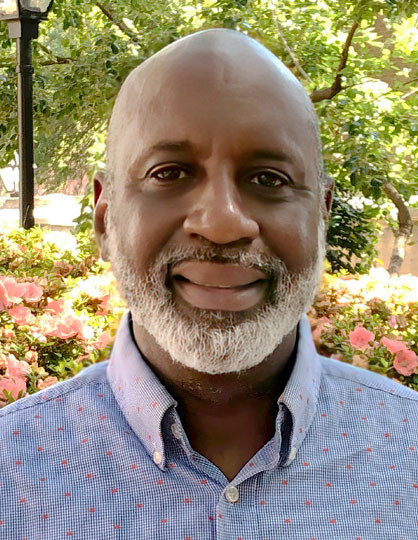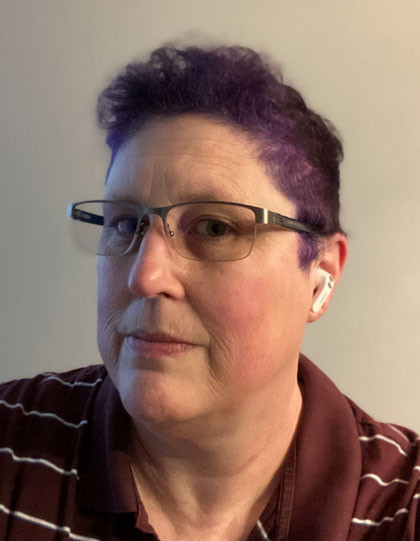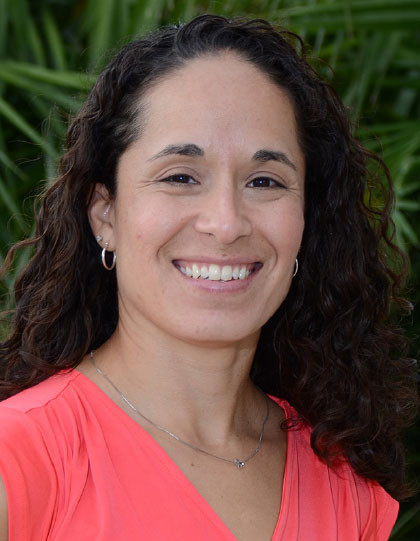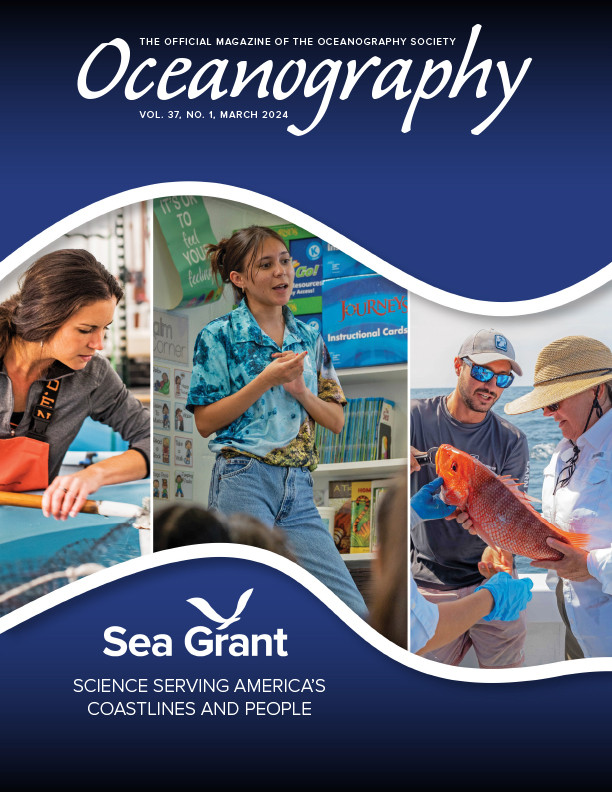Full Text
 |
LOUIS “LOUIE” D. HEYWARD
Executive Assistant and Office Manager, South Carolina Sea Grant Consortium, Charleston, SC, USA (louis.heyward@scseagrant.org)
Degree: When, where, what, and what in? I attended Furman University, a small liberal arts college in upstate South Carolina on a merit scholarship as one of the highest performing students in my school district. When I was a student, just 2.6% of the student body was non-White. There were just eight students of color in my class who were not there on athletic scholarships. We stuck together and are close friends to this day.
I earned two degrees: a bachelor of science in biology and a bachelor of arts in Spanish, and I also minored in music. I studied abroad at the University of Madrid for a year, where I became immersed in the culture by living with a Spanish family who spoke no English.
Did you stay in academia at all, and if so, for how long? No. In my senior year, I took an internship at the South Carolina Department of Natural Resources (SC-DNR) with Betty Winter, a researcher on blue crabs. She reached out to me after I graduated to offer me a job at DNR. While working, I also enrolled in a master’s program twice, but had to stop both times because of family illness—first to take care of my mom who eventually passed away from breast cancer, and then to care for my wife who is a three-time cancer survivor.
How did you go about searching for a job outside of the university setting? I’ve always been recruited for jobs, having been in the right place at the right time, where people could see my enthusiasm and commitment. This is why I encourage young people to take internship opportunities, because it will either lead you into something you’re excited about doing, or it will show you that you don’t want to go further down that particular path.
Is this the only job (post-academia) that you’ve had? If not, what else did you do? At SC-DNR, I became a specialist in aquaculture techniques and research for inland fisheries stock enhancement. I became known as the shortnose sturgeon guru!
SC-DNR has a strong education component. It happened that my office was next to the big fish tanks that tour groups would come to see, so when the groups came, I started talking to them about my work and research, and this led to a full-time education position. I became the education coordinator for the Ashepoo Combahee Edisto Basin National Estuarine Research Reserve, and eventually Director of Marine Education for the whole agency. I traveled all over the state to present education programs for students, even those upstate who had never been to the ocean.
What is your current job? What path did you take to get there? Like all the jobs before, I was recruited into this role. I had taken a sabbatical from marine science to set up my music teaching studio, something I had always wanted to do and that I continue to this day. During that time, my current position opened up at the South Carolina Sea Grant Consortium, and the Human Resources Manager invited me to apply. Though my title is Executive Assistant and Office Manager, I wear a lot of hats: I am in charge of all agency procurements and contracts, I’m part of the executive committee that oversees all new programs, and I co-lead the agency’s Diversity, Equity, and Inclusion Council.
What did your oceanographic education (or academic career) give you that is useful in your current job? I support the science happening every day by attending to the related administrative details. All that depends on the groundwork and on-the-job training that I’ve built over my career. Also, I am highly connected to the network of marine scientists in this region. I know who is in which roles and how to contact them.
Is there any course or other training you would have liked to have had as part of your education to meet the demands of the job market? Most of the things that I’ve done have required on-the-job training, and there is no substitute for that in coursework. More advanced statistics would have been helpful, but I figured it out as I went. If I were in school these days, I’d be sure to learn GIS.
Is the job satisfying? What aspects of the job do you like best/least? It’s very satisfying. I’ve always been the type of person who takes a leadership role wherever I am. I like to figure out solutions for people who come to me with their needs, from simple office-related issues to complicated administrative coordination that involves multiple agencies at the state and federal levels. On the other hand, a small state agency like ours has its pros and cons. SC-DNR had a staff of 1,200 people compared to 30 here at SC Sea Grant. We can make things happen without a lot of red tape, but we also must figure out creative solutions with the resources we have available—it’s a lot for a small administrative team.
Do you have any recommendations for new grads looking for jobs? Just do the work. It might not immediately be what you’re looking for, but it could evolve into something further down the road. When I was education director, I heard from students who had always wanted to go into marine science to work with dolphins. My advice was always to focus on the opportunity that’s in front of you because it might lead to what you want to do eventually, or it might show you something that you haven’t thought of but that you turn out to really like. I’ve been everything—a marine scientist, an educator, and now an executive administrator. Don’t limit yourself. Sometimes an early career position will show you what you don’t want to do as much as what you love to do. The first level jobs can help you understand what you love in life.
 |
KAYJ MORRILL-MCCLURE
Diversity, Equity, Inclusion, Justice, and Accessibility Lead and Information Technology Lead, University of Washington Sea Grant College Program, University of Washington, Seattle, WA, USA ([email protected])
Degree: When, where, what, and what in? I earned bachelor’s and master’s degrees in general engineering with a minor in gender studies/women studies, from Harvey Mudd College.
Did you stay in academia at all, and if so, for how long? No, I went into the aerospace industry right from college—my plan from a young age when I determined that I probably couldn’t be an astronaut.
How did you go about searching for a job outside of the university setting? I got a job in Shuttle Loads Analysis at Rockwell International, where my father was employed and where I had had a summer job.
Is this the only job (post-academia) that you’ve had? If not, what else did you do? My job with Washington Sea Grant (WaSG) is the most recent of a long list of jobs. I left the aerospace industry after five years due to layoffs and the upcoming move of my section to Huntsville, Alabama. I was in Southern California and wished to remain on the West Coast. I then worked for myself as a web designer just as web design was becoming a thing, mostly creating websites for small businesses. I also served as an adjunct faculty member at some for-profit schools and eventually at the University of Washington Information School. I found most of my teaching positions either by knowing someone who taught at the school or by seeing the job listed online.
What is your current job? What path did you take to get there? I learned that WaSG was seeking a website consultant through a friend of a friend. After helping WaSG staff finish their website, I applied for the IT job when the person I’d been working with retired. As WaSG’s DEIJA effort increased, I became part of the first DEI Committee appointed and then moved into helping lead efforts and DEIJA connections with other units and SG programs. Now, as the DEIJA and IT Lead for WaSG, I help lead and coordinate our organizational DEIJA work, including organization of collectives and affinity groups. I also lead and coordinate our organizational IT with an eye toward equity and accessibility.
What did your oceanographic education (or academic career) give you that is useful in your current job? My engineering background gave me a lot of practice figuring out why things aren’t working or how things might not work, which helps both sides of my job. Harvey Mudd is a college that aims to turn out scientists who can communicate. Every student accepted is strong in both science and humanities. I am constantly learning more about gender and power structures and marginalization, but the basis for my understanding came from my Harvey Mudd mentor, J’nan Morse Sellery, in gender studies and literature classes. I also think that knowing how to teach is the most valuable tool you can have in any job, especially any job that includes communication.
Is there any course or other training you would have liked to have had as part of your graduate education to meet the demands of the job market? It would have been nice to have had a class in all the different ways that our education (engineering) fits into different industries/businesses.
Is the job satisfying? What aspects of the job do you like best/least? My job is very satisfying. I get to combine two of my biggest interests in life—DEIJA and technology—and apply them in an organization that is improving the world, especially places like the ocean and Puget Sound. The best parts are the variety of what I do and getting to create new structures, processes, and trainings from scratch and making connections with the other people at WaSG. The part I like least is just how much there is to do and being interrupted a lot when trying to work on big projects.
Do you have any recommendations for new grads looking for jobs? I recommend finding your people, those with whom you can connect and relate, and then use those connections. Even though I was not great at networking, I got most of my jobs from connections I had made. Making those initial connections was difficult for me in the engineering industry, which is made up of and dominated by (usually White) straight cis men. I found my people with WaSG, where many others are also jacks of all trades/masters of none and life-long learners.
 |
MONICA WILSON
Coastal Debris Program Coordinator, Florida Sea Grant and University of Florida - Institute of Food and Agricultural Sciences, St. Petersburg, FL, USA ([email protected])
Degree: When, where, what, and what in? I hold master’s and PhD degrees in physical oceanography from the University of South Florida (USF) and a bachelor’s degree in marine science and computer science from Eckerd College.
Did you stay in academia at all, and if so, for how long? As soon as I graduated from grad school, I worked for several months in the academic affairs office at USF, helping to onboard new students and also designing online courses in marine science while I looked for a full-time job.
How did you go about searching for a job outside of the university setting? When I first started job hunting, I used the typical search engines, such as Monster, Indeed, LinkedIn, and Glassdoor, using keywords like “marine science” and “oceanography.” It’s surprising to see what comes up depending on the search term and job description. I set up alerts, uploaded my resume, and checked every day.
Is this the only job (post-academia) that you’ve had? If not, what else did you do? After the job at USF, I took a position with the Gulf of Mexico Sea Grant Oil Spill Outreach Team as an oil spill extension specialist for the BP oil spill. The Gulf of Mexico Research Initiative (GoMRI) needed a regional, multidisciplinary (biology, chemistry, physics) team to communicate oil spill science to stakeholders around the Gulf of Mexico. The team was made of six members, one specialist in each Gulf Sea Grant Program, plus a communicator and a regional coordinator. I was hired to fill the physical oceanography role through Florida Sea Grant to share science and results about oil spill models and where the oil went. I stayed in this position for nine years until the program ended.
What is your current job? What path did you take to get there? After my oil spill specialist position ended in August 2023, I was back at the search engines. While searching for a job, I was contacted by the PIs of Operation TRAP (Trash Reduction for Aquatic Preserves) to ask if I would be interested in applying for the Coastal Debris Project Coordinator position. I was very interested in working with marine debris and was happy to be considered for the role.
What did your oceanographic education (or academic career) give you that is useful in your current job? When I had applied to my previous job, I had no experience in oil spills, but I had a strong background in physical oceanography, and that’s why I was useful. It’s similar as I begin my new position: I don’t know much about marine debris, but I use my ability to learn about anything, including the research, rules and regulations, and goals of different organizations.
Is there any course or other training you would have liked to have had as part of your graduate education to meet the demands of the job market? I sit on a career panel for an interesting graduate class at USF that preps students for career success after graduate school. The students learn to build their resumes and talk with people in the field. I think this is a great class for other graduate programs to take on in some way. Also, I would have liked to have taken a communications course. Communication skills are as important as doing the science. I was able to build this skill on the job as I go, but it would have been helpful to have had it prior to being hired. It’s so important.
Is the job satisfying? What aspects of the job do you like best/least? It’s exciting! I enjoy getting out of the office to do fieldwork. In this job, I do everything from project design to data collection to communicating the information we collect. The project is brand new, so I get to help develop it from scratch, which is a challenge. We conduct marine debris clean-outs once a month, so I’m learning how to organize volunteers, ensure safety, and do the inevitable paperwork. There isn’t anything I don’t like. I like learning new things!
Do you have any recommendations for new grads looking for jobs? I’ve always told students, “Don’t limit yourself.” Don’t box yourself into what kind of scientist you are—widen your horizons and apply for anything and everything that sounds interesting. Just because you studied a specific type of marine science does not mean that’s what you’re going to do for your career. If you’re a great learner, your job search shouldn’t be limited.
Also, networking is very important. My latest job search was frustrating because I had applied for at least 20 positions without receiving many responses. It wasn’t until someone I knew had reached out to help me land the position I’m enjoying today.

